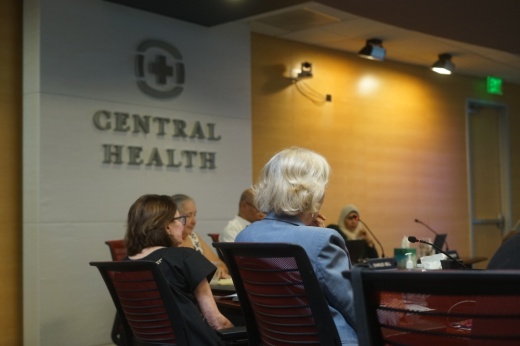The budget was approved at $744 million, an 18.4% year-over-year increase. Commissioners Ann Howard and Jeff Travillion along with Judge Andy Brown voted for the budget, while Commissioner Margaret Gomez voted against it, and Commissioner Brigid Shea abstained.
The tax rate was approved at $0.100692 per $100 valuation—an effective 6.5% year-over-year increase—and will cost the owner of an average-valued home in Travis County an extra $56 per year. The tax rate passed 4-1; Gomez voted against it.
Central Health provides health care services to low-income Travis County residents. To qualify, a family of four must have an income at or below $60,000, which is 200% of the federal poverty level.
The breakdown
Central Health’s FY 2023-24 budget includes about $295 million for health care delivery, $181 million for health care services and $28.6 million for administrative costs. The district has about $380 million in contingency reserves.
Shea said the reason she abstained from the budget vote was because it was “not acceptable that less than one-quarter of their entire $744 million budget was for health care services.”
Central Health also added $2 million to fund health care costs for people in Travis County jail, an ongoing $1.5 million to fund the county’s upcoming mental health diversion center pilot program and an additional $500,000 for the Black Men’s Health Clinic—budget amendments that were made following Travis County commissioners pushback on passing the budget.
The budget also includes $35 million for The University of Texas for an affiliation agreement, which has raised concerns from some court and community members who have questioned how the funding supports Central Health’s mission to provide health care to low-income residents.
A full list of Central Health’s FY 2023-24 budget uses is available here.
What they’re saying
Central Health officials have maintained they will use contingency reserves for the Healthcare Equity Plan, which includes 150 new projects and involves hiring over 200 people over the next seven years.
“This is a significant change that may be perceived as threatening to those not open to change,” Central Health Board Chair Charles Bell said. “However, we will continue to collaborate with our partners, and we will also be directly responsible for ensuring patients receive the services that they need.”
Central Health CEO Mike Geeslin said the district added money to its reserves following a 2018 audit performed by Germane Solutions that found it was “running lean” on finance, planning, information technology and human resources.
Diving in deeper
In a promotion video, Ascension Seton referred to Central Health’s reserves as a “massive war chest” that could be used to take over Dell Seton Medical Center at The University of Texas.
Ascension Seton and Central Health have been in an ongoing legal battle since January. Central Health sued Ascension Seton for not providing care for enough patients after citing a 21% decrease in services since the partnership began in 2013.
Ascension Seton responded with a lawsuit against Central Health, claiming Central Health had “misrepresented” its agreement and “distorted” numbers related to the Medical Access Program amid rising demand.
If the court finds Ascension Seton did not uphold its end of the agreement, Central Health would be legally allowed to purchase the hospital at fair-market value.
Geeslin denied the district was planning a “hospital takeover” with its contingency reserves during a Sept. 19 Travis County Commissioners Court meeting.
“We’ve communicated in several open meetings that we are investing our reserves in health care for people with low income. There is no set-aside of dollars in our budget or our seven-year forecast for purchasing a hospital. Period,” Geeslin said in a statement to Community Impact.
A Sept. 27 post on X, formerly Twitter, from Central Health said “Central Health makes sure Travis Co. residents with low income can get the quality of care they deserve from their safety-net hospital system. If Ascension won’t do its job, Central Health is prepared to purchase and operate the hospital.”

Ted Burton, Central Health Chief Communications Officer, said the post was scheduled in advance and not related to the budget passing.
Central Health has since deleted the post.
“That's the first time they've said that clearly. And I have been urging them to be clear with the community what their plans are for the hospital,” Shea said. “So it's interesting that they [posted] that out the day after the budget.”
Central Health has the lowest tax rate of any major urban hospital district in Texas, Burton said, due in part to the fact that Central Health does not operate its own hospital. Rather, Central Health has agreements with private hospitals, including Ascension Seton, to provide services.
What’s next
Travis County is in the process of conducting an $845,200 performance audit of Central Health. The audit was spurred by local activists who alleged Central Health lacked financial transparency and was approved in July 2022.
The results are expected to come back in early 2024.





